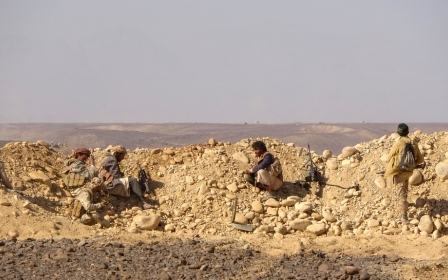Yemen: UN aid chief urges Gulf states to step up to avert 'man-made' famine

UN aid chief Mark Lowcock urged Gulf states to step up next Monday when the world body seeks to avert a large-scale "man-made" famine in Yemen by raising $3.85bn for humanitarian operations in the war-torn country for 2021.
The United Nations describes Yemen as the world's largest humanitarian crisis, with 80 percent of the people in need.
Stay informed with MEE's newsletters
Sign up to get the latest alerts, insights and analysis, starting with Turkey Unpacked
Lowcock warned on Wednesday that if the world body does not receive the money it needs at a virtual pledging conference on Monday "we're going to see is the worst famine the world has seen for decades".
In 2018 and 2019, the UN prevented famine in Yemen due to a well-funded aid appeal, which included large donations from Saudi Arabia, the United Arab Emirates and Kuwait, Lowcock said.
"What is alarming and what is different about the situation we're in now is that there's been such a big drop off in support for the aid operation that we've been cutting aid to starving people - not in an isolated way, in a way that affects millions of people all over the country," Lowcock said.
'On a knife edge'
In 2020, the UN only received just over half the $3.4bn it needed, which Lowcock said was largely due to smaller contributions from Gulf countries.
He urged them to pledge generously for 2021 and pay quickly.
"My message really to the Gulf countries... is you have an extremely important role to play here. What you did in 2018 and 2019 saved a lot of lives, frankly, and enabled us to avoid a total collapse and a tragedy of genuinely historic proportion. It's now back on a knife edge," Lowcock told reporters.
"This is an entirely man-made famine," he added.
A Saudi Arabia-led military coalition backed by Western powers intervened in Yemen in 2015, backing government forces fighting the rebel Houthi group. It has imposed an air, sea and land blockade on rebel-held areas.
UN officials are trying to revive peace talks to end the war as the country's suffering is also worsened by an economic and currency collapse and the Covid-19 pandemic.
Earlier this month, after US President Joe Biden said Washington would no longer back the conflict, which has caused an estimated quarter of a million deaths.
In his first major foreign policy speech, Biden said: "This war has to end. And to underscore our commitment, we're ending all American support for offensive operations in the war in Yemen, including relevant arm sales."
Middle East Eye delivers independent and unrivalled coverage and analysis of the Middle East, North Africa and beyond. To learn more about republishing this content and the associated fees, please fill out this form. More about MEE can be found here.






